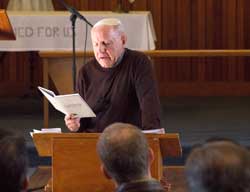A senior member of the Archbishop’s liturgical panel says resistance to written prayers is one of the key issues in gaining acceptance for the new prayer book.
Churches across Sydney have been ‘road-testing’ Common Prayer since it was introduced to Synod members in 2011. One of the framers of the book, retired Moore College lecturer Dr David Peterson took to the floor at the recent Georges River ministry conference as part of the feedback process before this year’s Synod is asked to commend a final version for the Diocese.
Amid complaints that prayer in churches was often inarticulate and superficial, one rector at the conference said young service leaders were reluctant to use “set prayers” because they regarded extempore praying
as more heartfelt and “authentic”. Dr Peterson described the issue as crucial and part of “the implicit spirituality in our churches”, saying the solution lay not in books or training sessions but in going back to the Bible.

Photo: Dr Peterson reads from the new development version at the Georges River conference
“There’s a whole spirituality of set words being used in the Bible, from the words Jesus gave his disciples to say in the Lord’s Prayer to the psalms,” he said. “It’s remarkable to me that people have no problem in singing set words written by somebody else but they won’t say words written by someone else. We have to be balloon prickers, otherwise we will end up with superficiality because of this presumed spirituality.”
Another rector drew laughter when he told of an incident during a service when a young leader read a prayer from the new prayer book. Her friends, thinking she had prayed extempore, congratulated her for the “awesome” prayer. Dr Peterson said consistent mingling of set and extempore prayers would help people see the substance and value of written prayers.
Panel chairman Bishop Robert Forsyth said the feedback since last Synod had resulted in a significant upgrade of the ‘development version’ of Common Prayer. “Every service has been improved,” he said. “There’s now a much wider range of intercessory prayers and a fourth Service of the Word and Prayer, incorporating some of the language and perspectives of Hebrews.”
The website for the new book bettergatherings.com will be updated to include all the revised material.
























